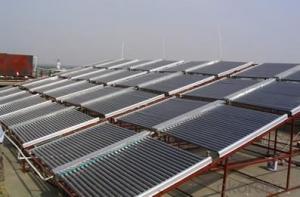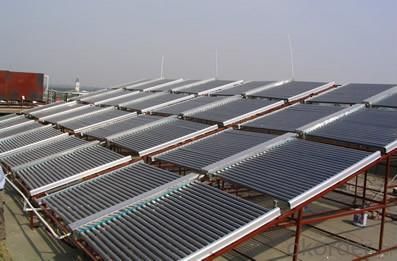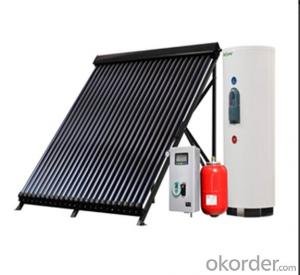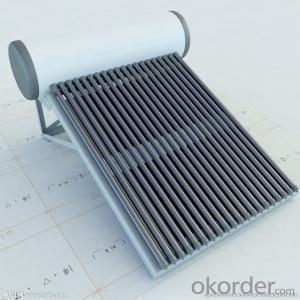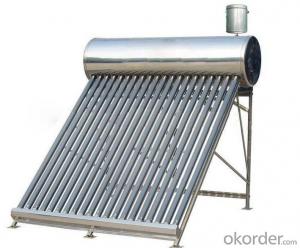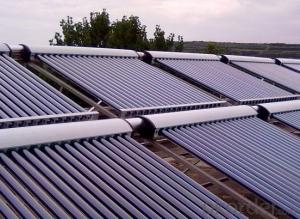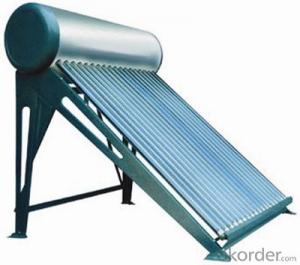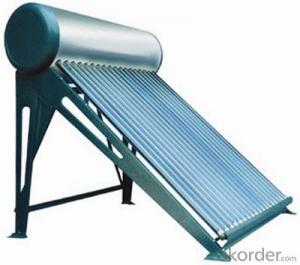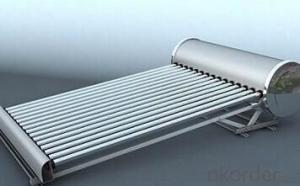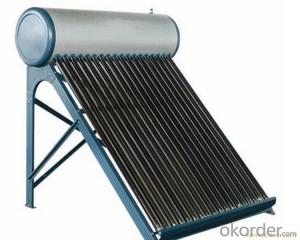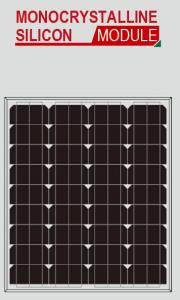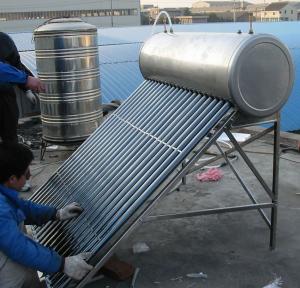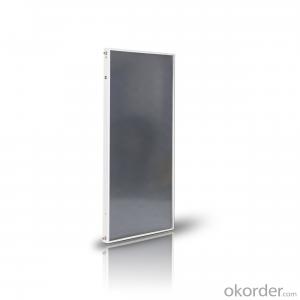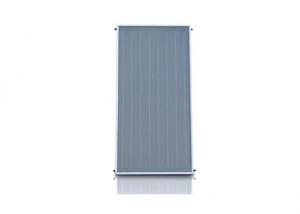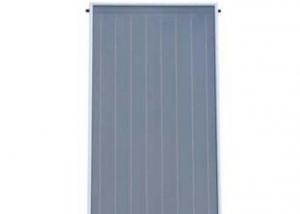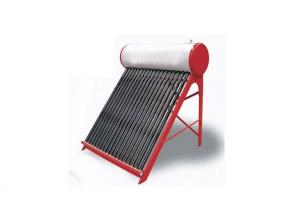80 Gallon Stainless Steel Solar Water Heater with Competitive Price
- Loading Port:
- China main port
- Payment Terms:
- TT OR LC
- Min Order Qty:
- 10 set
- Supply Capability:
- 1000 set/month
OKorder Service Pledge
OKorder Financial Service
You Might Also Like
Working Principle of Domestic Solar Water Heaters:
Solar energy, in essence, is an electromagnetic wave, a type of strong optical radiation, which is produced by thermonuclear fusion reaction. The energy of the solar radiation is transmitted through the liught of different wave length. The solar water heater is designed to mainly take in the energy of visible light & near ultra red light through the selective absorbing coating of vacuum tubes.When the water in the solar collector is heated by the solar radiation, its temperature rises. As a result, the water in the solar collector and the water in the tank form natural convection because of density contrast casued by the temperature difference. So the water of the higher temperature is incessantly forced into the insulated solar water tank( As shown in the figure).
Features
<1> Imported SUS304-2B food-level stainless steel,thickness:0.31~0.5mm
<2> Outer tank: High quality stainless steel,thickness:0.31~0.5mm
<3>Insulation: 50~55mm polyurethane foam
<4> Vacuum tube: CU/SS-AL/N red tube
<5> Frame: Stainless steel/Aluminum alloy,thickness:1.2~2mm
<6> Reflector: Stainless steel/Aluminum alloy as option
<7> Available accessories: Feeding tank,solar controller,electric heater, Mag rod,thermostatic mixing valve
Specification
ITEM.NO | SPECIFICATION | EFFECTIVE LIGHT AREA | TANK'S CAPACITY | APPLICATION PEOPLE | CBM | |||
DIAMETER OF WATER TANK | QTY OF TUBE(pcs) | DIAMETER OF TUBE | LENGTH OF TUBE | |||||
Z-NS5810 | 460mm | 10 | 58mm | 1.8m | 1.04 | 100L | 4 | 0.37 |
Z-NS5812 | 460mm | 12 | 58mm | 1.8m | 1.25 | 120L | 4-5 | 0.44 |
Z-NS5815 | 460mm | 15 | 58mm | 1.8m | 1.56 | 150L | 6 | 0.56 |
Z-NS5818 | 460mm | 18 | 58mm | 1.8m | 1.87 | 180L | 7-8 | 0.64 |
Z-NS5820 | 460mm | 20 | 58mm | 1.8m | 2.08 | 200L | 8 | 0.7 |
Z-NS5825 | 460mm | 25 | 58mm | 1.8m | 2.61 | 250L | 10 | 0.89 |
Z-NS5830 | 460mm | 30 | 58mm | 1.8m | 3.13 | 300L | 12 | 1 |
Z-NS5836 | 460mm | 36 | 58mm | 1.8m | 3.75 | 360L | 14-15 | 1.3 |
Z-NS5840 | 460mm | 40 | 58mm | 1.8m | 4.17 | 400L | 16 | 1.4 |
Z-NS5845 | 460mm | 45 | 58mm | 1.8m | 4.69 | 450L | 18 | 1.6 |
Product Details Show
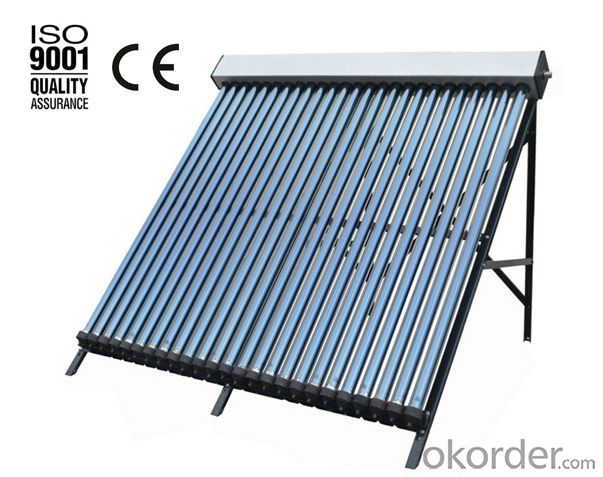
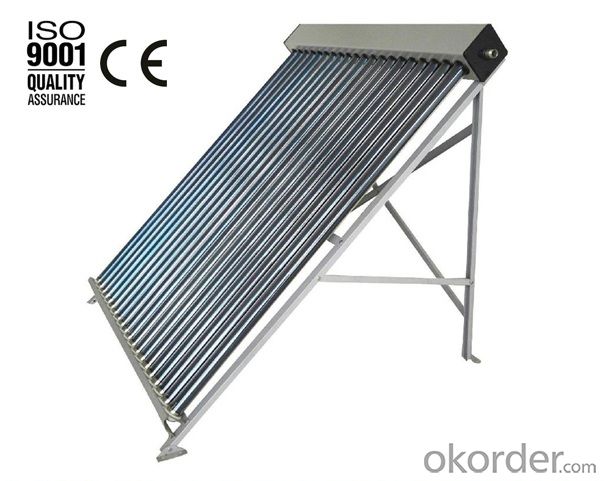
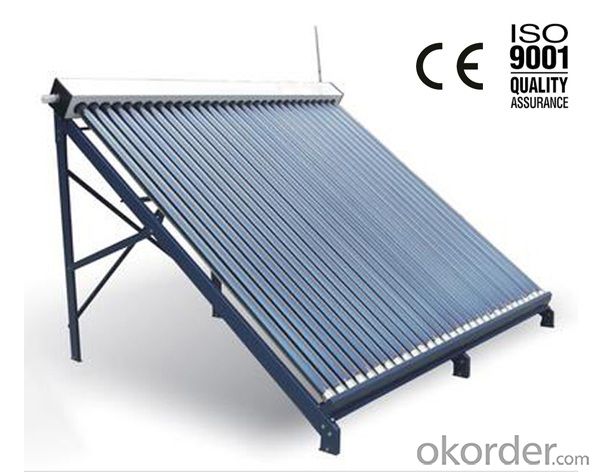
FAQ
1. Q: Are you a factory or trading company?
A: We are a factory. Especially for Solar Controller, PWM solar controller 50A12V/24V
2. Q: Where is your factory located? How can I visit there?
A: Our factory is located in Guangzhou, China. You are warmly welcomed to visit us!
3. Q: what other product you have except such Solar Lighting?
A: We have poly ,mono cells and panels. Off grid solar system, like off grid solar inverter, pure sine wave inverter, solar collector, solar controller, solar charger, Portal solar system, battery, DC Fan, Solar Led Light.
4. Q: Can the price be cheaper?
A: Of course, you will be offered a good discount for big amount.
5. How can I get a sample?
A: Please call us or send email for asking the samples.
- Q: Solar water heater installed under the probe at the leak, the new probe or water leakage, how the problem ah? How to solve?
- If you have other vents in the tank, it will be blocked and the sensors will be placed elsewhereSpecific need to solve the scene
- Q: How does the type of water being heated impact the performance of a solar water heater?
- The type of water being heated can impact the performance of a solar water heater in several ways. Firstly, the mineral content of the water can affect the efficiency of heat transfer. Hard water with high mineral content can lead to mineral buildup and scale formation on the solar collector, reducing its effectiveness over time. Additionally, the pH level of the water can impact the lifespan of the system, as highly acidic or alkaline water can cause corrosion or damage to the components. Moreover, the temperature of the water being heated can influence the overall performance of the solar water heater. Higher water temperatures may require more energy to achieve desired heating levels, potentially impacting the efficiency of the system.
- Q: How does a solar water heater affect the water pressure in a home?
- A solar water heater does not directly affect the water pressure in a home. The water pressure is determined by the municipal water supply or well system, and the solar water heater simply heats the water using solar energy. However, it's worth noting that some solar water heaters may have a storage tank, and if the tank is placed higher than the fixtures in the home, it may provide a slight increase in water pressure due to gravity.
- Q: How does the size of the solar water heater affect its performance?
- The performance of a solar water heater is influenced by its size in several ways. To begin with, the size of the solar collector, responsible for capturing the sun's energy, directly affects the amount of heat it can gather. A larger collector will have a greater surface area to absorb solar radiation, resulting in a higher input of thermal energy. This, in turn, can enhance the overall performance of the water heater by providing more heat to the water. Furthermore, the size of the storage tank also plays a role in performance. A larger tank can accommodate a larger volume of hot water, ensuring a longer supply during periods of low solar energy availability, such as cloudy days or at night. This contributes to a more consistent supply of hot water and improves the overall effectiveness of the system. Moreover, the efficiency of the solar water heater can be influenced by its size. A properly sized system will match the hot water demand of the household, minimizing energy loss and preventing overheating. An oversized system may produce excessive heat, resulting in energy wastage, while an undersized system may not adequately meet the hot water demands. Careful consideration of the size of the solar water heater is crucial in optimizing its performance. Factors such as household hot water consumption, climate conditions, and available roof space should be taken into account to ensure that the system is appropriately sized and effectively meets the hot water needs while maximizing solar energy utilization.
- Q: What are the common repair issues with a solar water heater?
- Some common repair issues with a solar water heater include leaks in the system, malfunctioning sensors or controllers, faulty pumps or valves, and issues with the heat exchanger or storage tank. Additionally, mineral buildup or scaling can also affect the performance of the system and require maintenance or repair.
- Q: Can a solar water heater be used in areas with limited access to environmental regulations?
- Yes, a solar water heater can be used in areas with limited access to environmental regulations. Solar water heaters are environmentally friendly and do not emit any harmful pollutants. They rely on clean and renewable energy from the sun to heat water, reducing the reliance on fossil fuels. Therefore, even in areas with limited environmental regulations, solar water heaters can be an effective and sustainable solution for heating water.
- Q: Does a solar water heater require a backup system?
- Yes, a solar water heater typically requires a backup system. While solar water heaters are highly efficient in converting sunlight into heat energy, they may not be able to provide hot water consistently throughout the year, especially during periods of low sunlight or heavy cloud cover. Therefore, having a backup system is important to ensure a continuous supply of hot water. Backup systems can vary, but commonly include an electric or gas-powered heating element that can be activated when the solar energy is insufficient. This backup system kicks in to heat the water when solar energy is not readily available, ensuring a consistent supply of hot water.
- Q: How does the orientation of the solar panels affect the performance of a solar water heater?
- The orientation of the solar panels plays a crucial role in the performance of a solar water heater. The ideal orientation for maximum performance is to have the solar panels facing south in the northern hemisphere and north in the southern hemisphere. This allows the panels to receive maximum sunlight throughout the day. If the panels are not properly oriented, they may receive less sunlight, resulting in reduced heating efficiency and overall performance of the solar water heater.
- Q: How does the energy output of a solar water heater compare to a traditional water heating system?
- The energy output of a solar water heater is generally higher than that of a traditional water heating system. Solar water heaters utilize the energy from the sun to heat water, which is a renewable and abundant source of energy. In contrast, traditional water heating systems typically rely on fossil fuels or electricity, which may be more limited and less efficient. Therefore, solar water heaters have a more sustainable and environmentally-friendly energy output compared to traditional systems.
- Q: How does the altitude of the location affect the boiling point of water in a solar water heater?
- The boiling point of water in a solar water heater can be significantly impacted by the altitude of the location. As the altitude increases, the atmospheric pressure decreases, resulting in a lower boiling point for water. This phenomenon occurs because the pressure exerted on a liquid directly affects its boiling point. At sea level, where the atmospheric pressure is high, water boils at 100 degrees Celsius (212 degrees Fahrenheit). However, at higher altitudes with lower atmospheric pressure, the boiling point of water decreases. For instance, at an altitude of 2,000 meters (6,500 feet), water boils at approximately 95 degrees Celsius (203 degrees Fahrenheit). The altitude of the location plays a crucial role in the efficiency and performance of a solar water heater. These systems rely on the transfer of heat from sunlight to heat the water. Solar collectors absorb sunlight and transfer the heat to the water. At higher altitudes, where the boiling point of water is lower, the water in the solar collector can easily reach its boiling point. This can result in the formation of steam bubbles within the collector, reducing the efficiency of heat transfer and potentially causing damage to the system. To address this issue, manufacturers of solar water heaters often consider altitude during the system design. They may incorporate additional features such as pressure relief valves or make design modifications to ensure the safe and efficient operation of the system at different altitudes. It is recommended to consult with the manufacturer or a professional installer to ensure that the solar water heater is appropriately designed and adjusted for the specific altitude of the installation location.
Send your message to us
80 Gallon Stainless Steel Solar Water Heater with Competitive Price
- Loading Port:
- China main port
- Payment Terms:
- TT OR LC
- Min Order Qty:
- 10 set
- Supply Capability:
- 1000 set/month
OKorder Service Pledge
OKorder Financial Service
Similar products
Hot products
Hot Searches
Related keywords
